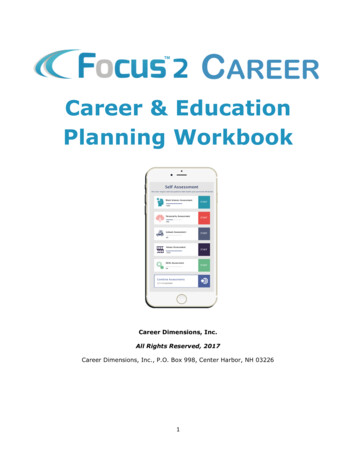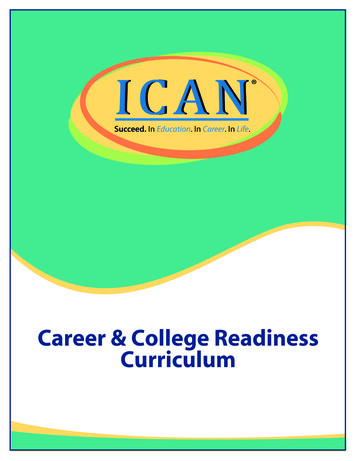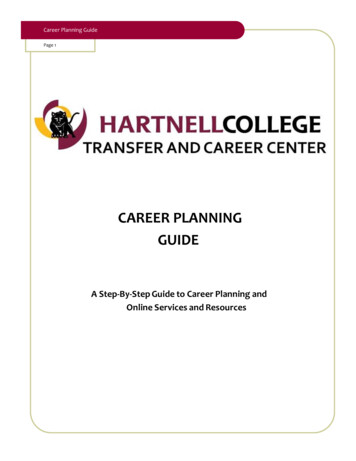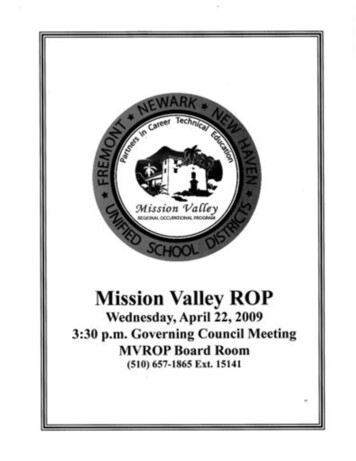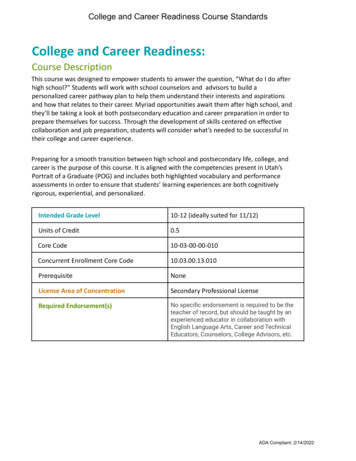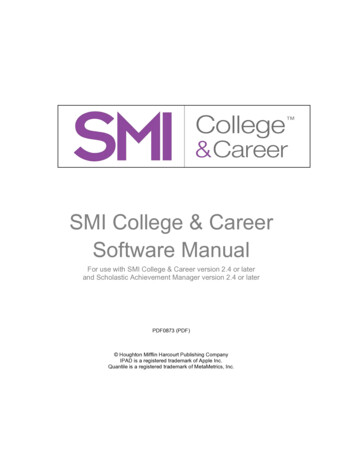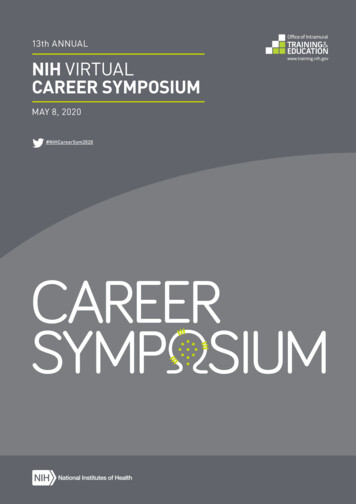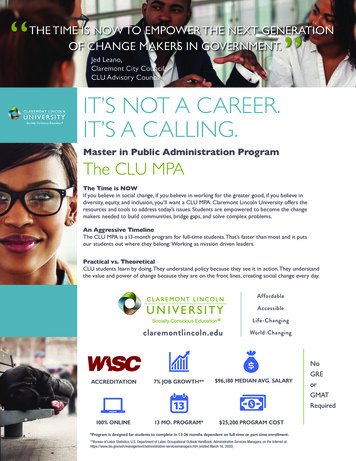
Transcription
Socially Conscious EducationIT’S NOT A CAREER.IT’S A CALLING.Master in Public Administration ProgramThe CLU MPAThe Time is NOWIf you believe in social change, if you believe in working for the greater good, if you believe indiversity, equity, and inclusion, you’ll want a CLU MPA. Claremont Lincoln University offers theresources and tools to address today’s issues. Students are empowered to become the changemakers needed to build communities, bridge gaps, and solve complex problems.An Aggressive TimelineThe CLU MPA is a13-month program for full-time students. That’s faster than most and it putsour students out where they belong: Working as mission driven leaders.Practical vs. TheoreticalCLU students learn by doing. They understand policy because they see it in action. They understandthe value and power of change because they are on the front lines, creating social change every day.AffordableAccessibleLife-ChangingSocially Conscious Educationclaremontlincoln.eduACCREDITATION7% JOB GROWTH**World-Changing 96,180 MEDIAN AVG. SALARY13100% ONLINE13 MO. PROGRAM* 25,200 PROGRAM COST*Program is designed for students to complete in 13-26 months dependent on full-time or part-time enrollment.**Bureau of Labor Statistics, U.S. Department of Labor, Occupational Outlook Handbook, Administrative Services Managers, on the Internet e-servicesmanagers.htm (visited March 16, 2020).NoGREorGMATRequired
Socially Conscious EducationJOIN THE WORLDCOMMUNITY.THE LINCOLN CONNECTIONCLU Founder David Colvill Lincoln (1925-2018) was grounded in the principles of The Golden Rule andethical practices. A Caltech-trained engineer, successful businessman, and philanthropist, David inspiredothers by practicing compassion and respect in every endeavor. His philanthropic vision for CLU was agraduate university designed to power positive social change.David Lincoln’s father, John C Lincoln, founded what is now the Lincoln Institute of Land Policy in 1946to help communities use land in ways that promote fairness, strengthen public services, and createopportunities for everyone to thrive.A Dynamic PartnershipThe internationally known and respected Lincoln Institute ofLand Policy has joined with CLU to engage students withreal-world cases and cross-sector answers for currentsocietal issues.This partnership will offer the opportunityto learn from proven land policy and usage experts. Solutionsto the housing crisis, rising inequality, local budget shortages,and climate change are examples of the issues that will betackled in a hands-on, boots-on-the-ground, manner.REAL WORLDCONNECTIONSCLU’s innovative partnership withthe Lincoln Institute gives MPAstudents a view of global issues.A Network Unlike Any OtherClaremont Lincoln University MPA students have a uniquecareer opportunity through a national network of faculty whoare scholar-practitioners in the field. There is also a powerfulMPA Advisory Council of professionals currently working inpublic administration. Students will be able to network withknown thought leaders who have dedicated their lives to solvingthe world’s toughest issues.These mentors will be part of the unique support andnetworking system enabling CLU MPA graduates to entertheir communities and the world with a broader view ofpolicy and the role it plays for the greater good.Socially Conscious Education
Socially Conscious EducationMASTER INPUBLIC ADMINISTRATIONThe courses for this 36-credit program are based on nationally recognized professional competenciesfor today’s practitioner-scholar. The courses alternate between relational and analytical to balance thelearning progress and to encourage application of new knowledge. Students will complete 12 courses inthe program, with two of those courses as electives in one of three concentrations:Public Service; Strategic Innovation for Collective Impact, or Advanced Public Administration.Program Learning Objectives:After completing the Master of Arts in Public Administration students will be able to: Develop strategies to lead a government or nonprofit organization so that it can achieve long termcomprehensive and equitable goals. Assess the political environment (local, regional, national, or global) Analyze and develop policy alternatives in order to create and implement impactful public policies. Facilitate collective action to achieve solutions that respect and include diverse stakeholderperspectives and achieve equitable results. Integrate ethical, equitable solutions to social, economic, and/or ecological problems across business,government, and civic sectors.THE CLAREMONT COREEssential Leadership SkillsThe Claremont Core is our change model and it’s embedded in every program and everything we doat CLU. It’s the foundation for the building of communities based on Diversity, Equity, and Inclusion.The CLU DifferenceMINDFULNESSUnderstanding the interconnected elements of theself to elevate leadership.DIALOGUEActive listening to empower genuine dialogue withothers who are different from us.COLLABORATIONLeveraging the intelligence of diverse stakeholdersto find common purpose.CHANGEAdapt from Core process learnings to form a plan,enact and catalyze sustainable, meaningful change.The CLU CapstoneBased on the Claremont Core and building on self-understanding, dialogue, facilitation, andcollaboration skills, learners apply research and leadership knowledge to create a tangible,visible outcome of learning applied to the workplace.
Socially Conscious EducationMPA COURSESMPA5301 Public Leadership and Governance (3 units)This course analyzes various aspects of public leadership, including political leadership, administrativeleadership, and civic leadership, and builds competence and confidence for distinctive, accountablepublic leadership where students live and work. In this course, students will gain theoretical and practicalknowledge that will help them crystallize their own leadership approach; and compile tools and guidanceto navigate the challenges that arise with often competing interests in civic and public institutions at local,regional, state and federal levels of government.MPA5302 Program Management and Scenario Building (3 units)This course covers the broad range of factors that the student needs to know to design, implement andtroubleshoot high quality programs or projects based on the analysis and understanding of current and historic trends and events. Students will begin to recognize patterns in the data which will allow them to makeinformed recommendations about pathways moving forward to realize the goals of projects avoiding pitfallsrevealed by the data. Students will be able to detail the phases of program development from design toevaluation, and continuous quality improvement using project management tools, including GANNT charts,flowcharts, RACIS, among others.MPA5303 Policy Development and Analysis (3 units)Examining key theories, practices, and challenges in creating and implementing policy changes, students inthis course will assess the strengths and limitations of the current policy landscape, conventional perspectives on political processes, governance, policy, and program management. Students will appreciate howthe policy process is never-ending, and they will attain tools and guidance that help them replace status quopractices in public and private institutions with policies suited for current realities.MPA5304 Introduction to Public Finance (3 units)“Public finance” as it is used in this course is the raising of revenues and spending of revenues by governments to achieve socially beneficial outcomes. This course will provide an overview of how the differentlevels of government in the U.S. raise and spend money and why they are given these responsibilities in thefirst place. The course content puts greater focus on state and local government and land-based financingtools.MPA5305 Urban Sustainability (3 units)In this course students will gain an understanding of the principles of urban sustainability, global frameworksfor sustainability, and how to apply them to specific cities and surrounding metro regions to understand whycities exist and how they grow. Through analyzing real world case studies that profile the challenges andsustainable solutions of specific cities, students will acquire the knowledge and skills to diagnose urbanchallenges, design interventions to make cities sustainable, and mobilize resources to implement them.MPA5306 Change Management in Complex Organizations (3 units)This course introduces students to the study of organizational theory and change management. Studentswill learn how complex organizations and agencies function as a whole, and will be able to understand therole of individual leaders within the system. With the understanding of these complex systems, students willbe able to talk about creating change to enhance diversity, equity, and inclusion. Students will gain guidanceon how to prepare, equip and support individuals within the organization and the organization as a whole tosuccessfully adapt to change in order to drive success and positive social outcomes.MPA5307 Building Networks and Coalition Building (3 units)Public Administration practitioners are consistently confronted with challenging social issues (e.g., homelessness, housing, poverty, healthcare, public safety, and mental health to name a few). Creating policysolutions in this environment requires a shift in mindset to prioritize relationships and recognize the websof connection which allow the practitioner to recognize how people relate to the issues and organize to findsolutions. In this course students will examine the history and current value of networks and the value ofcoalition building. They will be asked to select a case study to present where the policy outcome was drivenby coalition support. Students will learn how to build and grow their professional networks to fulfill thepower and potential of their policy making.MPA5308 Innovative Funding Strategies for Social Change (3 units)Building on the key principles of Public Finance, students in Innovative Funding Strategies for SocialChange will examine how to engage in values-based public funding budgeting. This advanced class willuse real case studies and subject matter experts to examine how to move the standard sources of funding for the public good. Students will look at grant funding, private foundation funding, and public/privatepartnerships to create layered funding sources for critical capital projects for social good. Utilizing theirnetworks, students will be asked to identify a capital project and build a proposal for funding. Students willthen develop a prospect list of funders. This list will be developed through a combination of their networkand project-based research. Students will be able to use the work developed in this course for immediateprofessional implementation.
Socially Conscious EducationMPA COURSESMPA5309 Masterplans and Policy Evolution (3 units)In this course students will learn how to produce guiding documents for public agencies and nonprofit organizations which state what the organization or other entity is and its value to the community,what the organization does, and why it does it. These planning documents provide the foundation fordecision making and are an implicit contract between the public agency and the community it serves.This course will enable students to be effective strategists to meet organizational mandates and toprovide frameworks for policy implementation. Students in this course will be asked to create and/orevaluate institutional strategic and master planning documents with the goal of being able to return totheir organizations and leading planning efforts for the public good.MPA5310 Civic Engagement and Complex Social Issues (3 units)In this course, students will learn that, across local and global issues, individuals must be mobilized tocreate the power to promote change within a community. Various approaches to community engagementand mobilization will be discussed, and students will appreciate the conditions that contribute to orthwart community engagement and how to respond to these conditions. Students will be exposedto examples of community engagement in action, and will take away techniques they can employin their own communities.MCC5320 Invitation to Inquiry: Foundations of the Claremont Core (3 units)In this university-wide foundational course, learners begin their engagement with the four domains thatmake up the Claremont Core domains: Mindfulness, Dialogue, Collaboration, and Change. These fourdomains consist of transferable skills and resources that support leadership and facilitation capacitiesthat accentuate students’ professional work. Students become familiar with aspects of mindfulness anddialogue that will undergird their work. Concepts of collaboration and change leadership are also introduced, and students begin the process of locating their work in a community where positive social changecan be facilitated. Finally, students also determine the scope and aim of their Capstone Projects andbegin to use resources from the four Claremont Core domains to build their research repertoireand leadership acumen.MSC5300 Strategic Communication: Building Diversity, Equity, and Inclusion (3 units)In a world that is reimagining what is possible, Strategic Communication: Building Diversity, Equity,and Inclusion will present students a historic perspective of the legacy and manifestation of structuralracism, and other societal and cultural marginalization including the unintended consequences ofsystemic exclusion. Students will build upon the principles learned in the Claremont Core to createenvironments where difficult conversations can take place with both internal and external audiences.This course will equip students to tackle challenges with diverse teams using language whichacknowledges and respects difference to create equitable outcomes. In this course, students analyzeself, personal strengths, and biases, and accumulate tools and communication skills in dialogue,collaboration, and bridging across divides. With these tools, students hone their abilities to buildadvocacy for dismantling oppressive structures and rebuilding personal, professional, and civicspaces that maximize diversity and facilitate equity and inclusion for all.MCC5321 Activating the Claremont Core : Research Methods (3 units)This course builds on the foundational aspects of the Claremont Core , focusing on how students canbecome mindful, engaged, and inquisitive research practitioners for positive social change. Students willdevelop an ability to critically evaluate what research methods are best suited for certain types of researchprojects. This course will specifically focus on the role of research methods that can address, illuminate,or explain enduring and newly salient social problems. Throughout the course students will consider theentire research design process, learning how to conceptualize, problematize, diagnose, understand, andtranslate findings across social, political, environmental, healthcare, and organizational contexts. By theend of this course, students will have had experience posing research questions, exploring their ownresearch goals, understanding the primary components of the research design process, and consuming avariety of styles of inquiry and action. Students will also consider course concepts in the context of theirown future projects, and begin activating the research skills they will use in Applying the Claremont Core Capstone Course. (Prerequisite: MCC 5320: Invitation to Inquiry: Foundations of the Claremont Core )MCC5332 Applying the Claremont Core : CLU Capstone (3 units)As the culminating course in all programs, students apply skills, knowledge, and professional applicationlearned throughout the degree. The planning for this course begins at the start of the program, continuesthrough the evolution of learning as students design their projects, and peaks with students being prepared to implement the project during the capstone course. The specific content in each student’s degreeprogram provides a foundation for the research and design. The Capstone Project demonstrates studentmastery of program and institutional learning outcomes.
Socially Conscious EducationCONCENTRATIONCOURSESPublic ServiceMPA5306 Change Management in Complex Organizations (3 units)This course introduces students to the study of organizational theory and change management. Students willlearn how complex organizations and agencies function as a whole, and will be able to understand the role ofindividual leaders within the system. With the understanding of these complex systems, students will be ableto talk about creating change to enhance diversity, equity, and inclusion. Students will gain guidance on howto prepare, equip and support individuals within the organization and the organization as a whole to successfully adapt to change in order to drive success and positive social outcomes.MPA5307 Building Networks and Coalition Building (3 units)Public Administration practitioners are consistently confronted with challenging social issues (e.g., homelessness, housing, poverty, healthcare, public safety, and mental health to name a few). Creating policy solutionsin this environment requires a shift in mindset to prioritize relationships and recognize the webs of connectionwhich allow the practitioner to recognize how people relate to the issues and organize to find solutions.In this course students will examine the history and current value of networks and the value of coalitionbuilding. They will be asked to select a case study to present where the policy outcome was driven bycoalition support. Students will learn how to build and grow their professional networks to fulfill thepower and potential of their policy making.Strategic Innovation for Collective ImpactMPA5308 Innovative Funding Strategies for Social Change (3 units)Building on the key principles of Public Finance, students in Innovative Funding Strategies for SocialChange will examine how to engage in values-based public funding budgeting. This advanced class willuse real case studies and subject matter experts to examine how to move the standard sources offunding for the public good. Students will look at grant funding, private foundation funding, andpublic/private partnerships to create layered funding sources for critical capital projects for socialgood. Utilizing their networks, students will be asked to identify a capital project and build a proposalfor funding. Students will then develop a prospect list of funders. This list will be developed through acombination of their network and project-based research. Students will be able to use the workdeveloped in this course for immediate professional implementation.MPA5309 Masterplans and Policy Evolution (3 units)In this course students will learn how to produce guiding documents for public agencies and nonprofit organizations which state what the organization or other entity is and its value to the community,what the organization does, and why it does it. These planning documents provide the foundation fordecision making and are an implicit contract between the public agency and the community it serves.This course will enable students to be effective strategists to meet organizational mandates and toprovide frameworks for policy implementation. Students in this course will be asked to create and/orevaluate institutional strategic and master planning documents with the goal of being able to returnto their organizations and leading planning efforts for the public good.
Socially Conscious EducationCORE MPA FACULTYAudrey D. Jordan, Ph.D., CPCDr. Jordan has a Ph.D. in Social Policy and Social Work from Virginia Commonwealth University, and she has anMSW in Social Work (policy concentration) from Virginia Commonwealth University, and a Master of Arts inPsychology from the University of Virginia. She is currently the Jerry D. Campbell Professor of Civic Engagementat Claremont Lincoln University, and a consultant specializing in developmental evaluation,network organizing,place-based community collaboration and organizational development. She has a background in community-basedresearch, philanthropy and academia. She will is a champion for scholarship and public leadership that is groundedin democratic principles, data-based, equitable solutions to community problems, and civil, cultural competence.She is proud to have been named the Jerry D. Campbell professor in honor of one of CLU’s founders and strivesto live by his example.George “Mac” McCarthy, Ph.D.Dr. McCarthy has a Ph.D. in Economics from the University of North Carolina at Chapel Hill, an M.A. in Economics from Duke University, and a Bachelor of Arts in Economics and Mathematics from the University of Montana.He is currently the President and CEO of Lincoln Institute of Land Policy in Cambridge, MA. The Lincoln Instituteseeks to improve quality of life, the effective use, taxation, and stewardship of land; it researches and recommendscreative approaches to land as a solution to economic, social, and environmental challenges. Mac has served fordecades in philanthropy at several foundations with national and international reach, working to address inequities in transportation, housing, and land use. Mac, along with other Lincoln Institute staff and faculty, are partnering with CLU to develop the MPA program; the institute’s expertise, experiential learning opportunities and otherresources will add contemporary, real world and concrete benefits to our students’ learning.Kendra Smith, Ph.D.Dr Smith’s Ph.D. is in Community Resources and Development from Arizona State University. She has an MPAfrom the University of Oklahoma, and a Bachelor of Arts in Political Science and Communication from theUniversity of Central Oklahoma. Her current scholarly and practice interests are in community health researchand community engagement. She is a prolific researcher and author having recently been the Associate Directorfor Community Engagement and Research in the Center for Population Health Sciences at Stanford University.She is a big proponent of the use of big data use in the nonprofit sector to drive needed social innovation. Shehas been valuable in the development of the MPA program and also teaches within the Claremont Core andthe M.A. in Social Impact program at CLU.Rigoberto Rodriguez, Ph.D.Dr. Rodriguez has a Ph.D. in Geography from the University of Southern California, a Masters in Urban andRegional Planning and a Bachelor’s in Comparative and Spanish Literature from the University of California, Irvine.Rigo was elected as a Governing Board Member of the Santa Ana Unified School District in November 2016.He still serves in this role. In addition, Dr. Rodriguez is an Associate Professor of Latina/o Public Policy in theDepartment of Chicana/o and Latina/o Studies at California State University, Long Beach. A nationally recognizedexpert in community planning, action research, and grassroots leadership development, Dr. Rodriguez has workedwith many organizations and communities locally and internationally to improve the lives of children, families, andneighborhoods. In 1993, Rigo started his career at Delhi Center, a nonprofit agency in one of the oldest Mexicanneighborhoods in Santa Ana, CA, where he coordinated health, family and community programs and participatedin a neighborhood movement to build the largest community center in the city, owned and operated by theneighborhood’s nonprofit agency. He is a member of the Board ofDirectors for Delhi Center. Rigo has been onthe CLU faculty in the Master of Arts in Organizational Leadership, Civic Engagement concentration, and is astrong advocate for CLU, given our shared emphasis on ethical leadership, and equity, diversity and inclusion.
diversity, equity, and inclusion, you'll want a CLU MPA. Claremont Lincoln University offers the resources and tools to address today's issues. Students are empowered to become the change makers needed to build communities, bridge gaps, and solve complex problems. An Aggressive Timeline The CLU MPA is a13-month program for full-time students.
